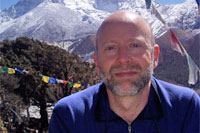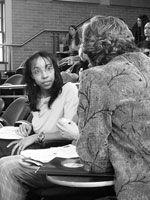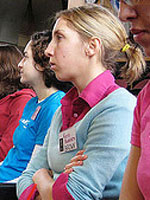« Prev Next »
 In today's podcast, Ilona interviews astrophysicist David Targan, an Associate Dean of the College and Dean for Science Programs at Brown University. He established the first Women in Science and Engineering (WiSE) program at Brown. WiSE is a program funded by the National Science Foundation to increase retention of women in science education. Many universities across the country now have NSF-funded WiSE programs. Listen to this podcast to find out the path of the WiSE program at Brown and some things you may not have known about why women and minorities can be at a disadvantage in the science classroom. A full transcript of the podcast is below. [16:59]
In today's podcast, Ilona interviews astrophysicist David Targan, an Associate Dean of the College and Dean for Science Programs at Brown University. He established the first Women in Science and Engineering (WiSE) program at Brown. WiSE is a program funded by the National Science Foundation to increase retention of women in science education. Many universities across the country now have NSF-funded WiSE programs. Listen to this podcast to find out the path of the WiSE program at Brown and some things you may not have known about why women and minorities can be at a disadvantage in the science classroom. A full transcript of the podcast is below. [16:59]
![]()




Full transcript
ILONA MIKO: Welcome to the latest edition of NatureEdCast by Nature Education. I'm Ilona Miko and today we're talking to David Targan from Brown University about trends in the education of women in science and engineering. David is Associate Dean of the College and Dean for Science Programs at Brown. He established the first Women in Science and Engineering Program at Brown, also known as the WiSE Program. WiSE stands for Women in Science and Engineering and is a program funded by the National Science Foundation to increase retention of women in science education. Welcome, David.
DAVID TARGAN: Hi, how are you?
MIKO: Good. Thanks for joining us.
TARGAN: Sure.
MIKO: So I understand your training is in physics and astronomy. Can you tell us a little bit about how your background introduced you to some of the disadvantages women have in the hard sciences?
TARGAN: Well, originally I had been on the faculty in the physics department at Brown and I had been at a conference in Maryland about the subject of women in physics, sponsored by the American Physical Society. When I was there I met some people who were formerly associated with Brown and they may have been undergraduates and graduate students. But I met a woman who had been an undergraduate at Brown and she described how difficult it was for her to find other women in physics at Brown and to feel at home in the physics department. At the same time there's a Women's Center at Brown and it's still a very strong and thriving center for support of women of all interests at Brown. And she felt at least at that time, and that was I think in the late seventies, early eighties that the women at that center were not necessarily that favorably disposed towards women in the hard sciences.
MIKO: Oh. Why is that?
TARGAN: You know, I think a lot of it is that there has been for a long time kind of a backlash against the sciences and physics in particular. I think maybe a little bit less so now, but for many years associated with the involvement of physics in things like the production of the atomic bomb and other not so nice things as seen from the point of view of a lot of people who are critical of the sciences, physics in some ways.
MIKO: Physics was like the evil empire of all the sciences?
TARGAN: Yeah. It represents kind of the heart of it all. You know, if people are anti-technology for various reasons, engineering and physics is going to get a bad rap. And so I think she didn't necessarily feel as welcome as someone who was studying gender studies or someone who was studying history or the humanities would have felt. So she was struggling with finding a place between these two worlds, between the world of women at Brown and the world of physicists at Brown. I think most of the members of the physics department at the time were not as aware that this was an issue and she had already been out of Brown for several years and at the time that I met her was a graduate student at Berkeley and had started a program to encourage women in graduate school at Berkeley and also to really enlighten the faculty about what was going on there. And so I thought maybe we should do the same thing at Brown. And we did.
MIKO: So you created this WiSE program. Tell us a little bit about how one goes about doing that at any university.
TARGAN: Well, it's very straightforward really. We looked for the people that we knew would be allies. Women of course but men as well that appreciated that there was a problem so to speak, that women faced certain obstacles that men didn't face. And we brought them together and we asked them if they would mind being mentors or playing some kind of role in a program. We established a tiered mentoring system where older students could mentor incoming first year students. The first year is where we lose a lot of students, men and women, from the sciences. So having a mentor system for the first-year students by older students and then having all students being mentored by faculty, we have a tiered vertical structure.
MIKO: A tiered mentorship system.
TARGAN: Right.
MIKO: And are all the upper-level students women mentoring younger women?
TARGAN: Yes. The upper level students are women mentoring younger women. What they're able to do is really provide the perspective that you get after you've kind of been through some of the tough introductory science courses and once you've started doing some research and once you get to some of the things that are a little bit more current and more interesting, in your later years as an undergraduate or even as a graduate student. So you as a mentor you're really bringing a perspective of what it took for you to survive.
MIKO: To survive the boot camp of the intro courses.
TARGAN: Of the intro courses. And also how to navigate, both in terms of course selection and how to deal with failures. Because failures are an important part of science itself.
MIKO: What do you mean by failures?
TARGAN: Starting off with the first failures that occur in early exams that are very different from the kind of exams that many high school students are taking. So all of a sudden you're taking a different kind of exam and you have different expectations. But even in something that's not really a test of one's own knowledge, like research, where it's really built in in effect to the experimental design, there are going to be failures just because there's a lot of trial and error involved. So getting used to that and being OK with it but still moving on is what part of that mentorship role is about.
MIKO: So what do you say to the people who say well, these intro courses are about weeding out the weak, separating the wheat from the chaff and this whole and this whole survival of the fittest mentality that I think a lot of people encounter in some intense science programs?
TARGAN: Well, I think from the point of view of the instructors they certainly don't feel that way. They are looking at these courses as opportunities for them to teach as much of the science as possible, to cover the basic in the intro courses. But it may be an unintended effect in any cases that certain students don't feel after their first few exams or after their first semester that they belong. Interestingly, it doesn't necessarily correlate with actually how well they're doing. So that in somebody's eye, people who are specializing in cognitive psychology, for example, or social psychology, the people that leave often are the people that actually were doing better but there was a disconnect between their self-perception of how well they were doing and how well they really were doing relative to the rest of the class, so that—
MIKO: Is this disconnect more prominent in women than it is in men?
TARGAN: Yes. So that is a gendered effect right there.
MIKO: Interesting.
TARGAN: So because that is a gendered effect and because that's much more common among women than it is among men and the same relates to how well students integrate the experience they have with test results, low scores, numbers in the 30s or 40s, two things. One is that it may not be that bad a score in the physical sciences.
MIKO: 30 or 40 out of 100?
TARGAN: Out of 100. It's not ideal but it's also historically true that these tests are sometimes overly hard and ultimately—
MIKO: Sometimes a 35 is an "A."
TARGAN: Sometimes it can be a lot better grade than you think it is, yeah. But another thing is that there's another gendered effect which is that women tend to attribute the lower scores to a failing within them and men tend to externalize more. So they'll say, "Well, that was just a poor test."
MIKO: Interesting.
TARGAN: So that once you have any kind of gendered effect like that, once you have anything that discriminates across any kind of characteristic, whether it's gender or race or any another characteristic, then all of a sudden you have a possible explanation as to why the numbers are as they are, which is that in the physical sciences there are far fewer women at each point along the pipeline you lose more—
MIKO: Yeah, the attrition. The attrition is higher than in women.
TARGAN: Exactly. So that at least in part explains what's going on. There're other factors but that's one of them.
MIKO: So this mentorship thing that you were talking about and the supports along the way, teaming younger students with upper-level students sounds really interesting. I'm curious, what's some of the response you've gotten at Brown or in general from men, who see that there's a support structure for women, special for women, in getting through these hard parts of their college careers? Have you ever had any backlash from men?
TARGAN: Well, initially, I have to say we had a lot of backlash. And we had faculty — of course all men, because until fairly recently most physical science faculty were men but in any case — saying things like, "This money could be better spent on research. I'm going to let the NSF know that," even though these were not by research standards very large grants and they have a lot of bang for their buck in terms of our evaluations. But nevertheless.
MIKO: So how do you respond to some of these criticisms?
TARGAN: Well, you know, I think what we did do is actually meet with each science department and talk to the members of the department about the statistics. Scientists love looking at statistics and tearing them apart and challenging you on them. But at least they have something that they can deal with that's more along their line of expertise; that is, something quantitative. And so we would just go to departments and say, "Look, you explain it. There's only two out of a hundred concentrators in the last five years," and you compare that. And of course the easy answer is well, maybe women aren't cut out for the sciences, take a look at.
MIKO: Yeah. That's a Larry Summers explanation, right?
TARGAN: Right. That was the Larry Summers explanation, or at least what as far as we know, what we think it was. But then you take a look at departments in other countries, for example, where for whatever reason the culture was such that women were doing as well or better than men in physics.
MIKO: Interesting. What cultures?
TARGAN: Italy is a good example where there's a lot of theorists in physics that are female. And so it's fairly easy to knock that argument down and say that actually it's not really a genetic difference, there are other factors, as I say social factors or environmental nurture factors that have to do with difference. And then the question is there's not much as university faculty that we can really do to help the situation before they get here but what can we do while they're here.
MIKO: So do you think men already have a support structure of their own?
TARGAN: Well, yeah. I mean, I think many of them they ask, "Why isn't there a MiSE, Men in Science and Engineering?" My answer to that has always been, "Well, there is actually a MiSE program and it's just called Science." And part of it is a little invisible because if members of the department are routinely going out for beer and watching the game or something like that, doing something that maybe is more, now this is really generalizing here, of course. But it's important because generalizations mean something in terms of overall statistics. If that's what's happening in a department, then they may not be aware a certain population of men as well as a larger percentage of women may not feel comfortable with some of these—
MIKO: Informal.
TARGAN: —informal, right, kinds of interactions that ultimately play a role in who gets promoted to the front of the class.
MIKO: Or who may get extra attention when they need it and they may not know they need it or something like that.
TARGAN: Exactly.
MIKO: So men have a lot of their own role models I guess in the physical sciences because of the history of that being disproportionately in men.
TARGAN: Right.
MIKO: How do women find these role models? Is WiSE doing anything for that?
TARGAN: Well, we've had the last couple of years, under the leadership of President Simmons and other senior administrators who really pushed very hard and have been able to help departments find female role models. So more of the physical sciences now have more women that are on tenure track or tenured. But initially we had to really look outside the departments, look at other departments within the sciences but maybe not quite the same discipline, to find role models who were also pretty sympathetic to the undergraduates and the graduate students. Or bringing women in from the outside that were just profoundly successful. These were people that were members of the National Academy or had succeeded in some really significant way and no one could deny that they were successful—
MIKO: Apart from their gender representation.
TARGAN: Right. And so there's something that people in the field of women encouraging women and other under-represented groups to go into the sciences call the existence proof. So that it doesn't take much as it turns out for someone to change their mind and believe that they themselves could be a scientist. If there's somebody out there that shares some common characteristics that they can identify with it might be—
MIKO: It might be enough to get them to sign up again next semester or?
TARGAN: That's right, it might be enough. And it doesn't mean you have to have hordes of women in physics to convince someone that it's possible. If they find somebody that they can relate to and is willing to spend a little bit of time with them over lunch and encourage them and describe a little bit about what they did and how they got to where they are, then that often is enough. Having speakers come and give a talk at the department, a research talk, just like any other speaker, part of the regular weekly colloquia series, but also spend that night at dinner or the next day at lunch with students was the way to provide role models when there were very few role models at the time on campus.
MIKO: Speaking of research, how important do you think actual research and lab research mentoring is to the retention of women in any science discipline?
TARGAN: I think it's extremely important because it really shows students what science is all about. It's just really hard to talk about it and just kind of learn about it in a sort of an elliptical sort of way. Whereas when you're doing it you're actually doing it and now you have a gut feeling, a real feeling, a hands-on experience of what it means to try something and see what works and what results come out and what those results might or might not mean. All of that participation in that research experience does a tremendous amount for the student and helps propel them through some otherwise maybe somewhat boring but necessary courses that we all have to go through as part of our—
MIKO: Part of the regular training.
TARGAN: Regular training. There's just a lot of things today you sort of have to know whether it's exciting or not. And then, but then you get to some of the really good stuff in research. The other effect that it has is on the faculty because they see students who may not have been very outspoken in class because they were the one woman or the one person of color in the class and it felt a little bit like they were on the spot when they were talking. It's a little bit intimidating asking questions in a college classroom to begin with. Well, in the lab situation it's very different. There's not the time pressure. You don't feel scrutinized by other students or by.
MIKO: So students report being more comfortable asking questions in the lab environment?
TARGAN: Yeah. And a good lab environment encourages that. And you'll also be in a setting where you'll be doing an experiment with someone who's on the faculty and you'll ask a question that they're thinking of, too, and they don't know the answer to. This was not part of the result that you get from an experiment. It's something that would be surprising to everybody. And then you start to see that—
MIKO: There's no right answer.
TARGAN: —there's not always a right answer, right. That's right. Then the process of asking questions is so important. Then also from the faculty's point of view they start to see well, this student is actually much more interested in the field than I thought and I'm going to spend more time with her.
MIKO: So do you think these WiSE programs are working? They've been around at Brown I guess since the early nineties.
TARGAN: Yeah. And there's a number of them around the country. I think they are. I think one notable effect that you see at Brown is that newer faculty that are coming in and applying for jobs as positions open up in the sciences, men and women, will often ask about is there a WiSE program on the campus or is there a Society of Women Engineers or some other similar program, because they'd be interested in participating in it.
MIKO: Wow. So it's reached, it's been around long enough to influence people who are looking for their own faculty positions. Interesting.
TARGAN: Right, right. So as new faculty come on board, they're coming from places that have programs and they saw, and this includes men and women, they saw the benefit of their program to their fellow students and they at this point in their careers are thinking how can I be helpful, can I give a talk or can I do something because it was such a positive program at my previous school. We know it's successful because of that. We also know that graduates report back that it was the WiSE program that really encouraged them to stay.
MIKO: And perhaps move on into graduate school.
TARGAN: And go on, that's right. That's definitely a strong effect.
MIKO: It sounds like you're doing some really good work and it's fun to hear that there's, it's been around long enough so we can actually measure how successful it's been. It's always a great idea when it starts, but it's nice to evaluate a program when it's been around for a while.
TARGAN: That's right.
MIKO: Thanks, David, for talking with us today. That was really interesting. Thanks for joining us.
TARGAN: You're welcome. Good to talk with you.
MIKO: Thank you for listening to this edition of NatureEdCast. You can find this podcast and others at nature.com/scitable. That's nature.com/s-c-i-t-a-b-l-e. Please join us again next time.























Good Luck